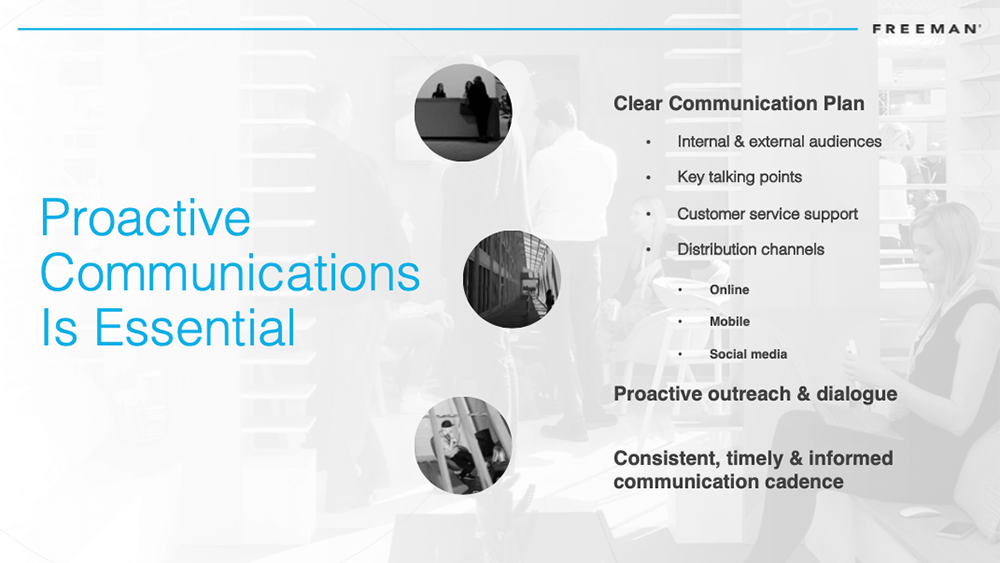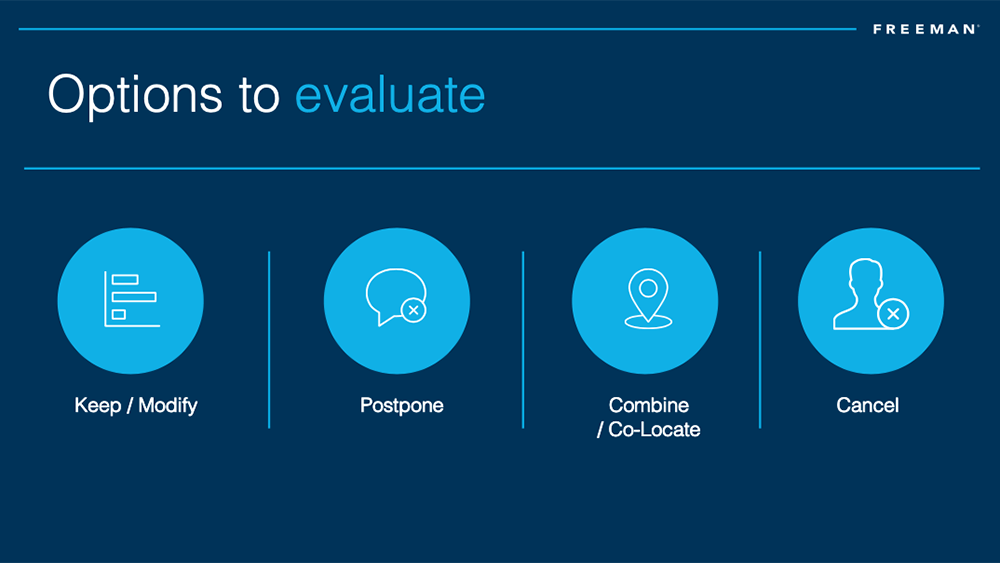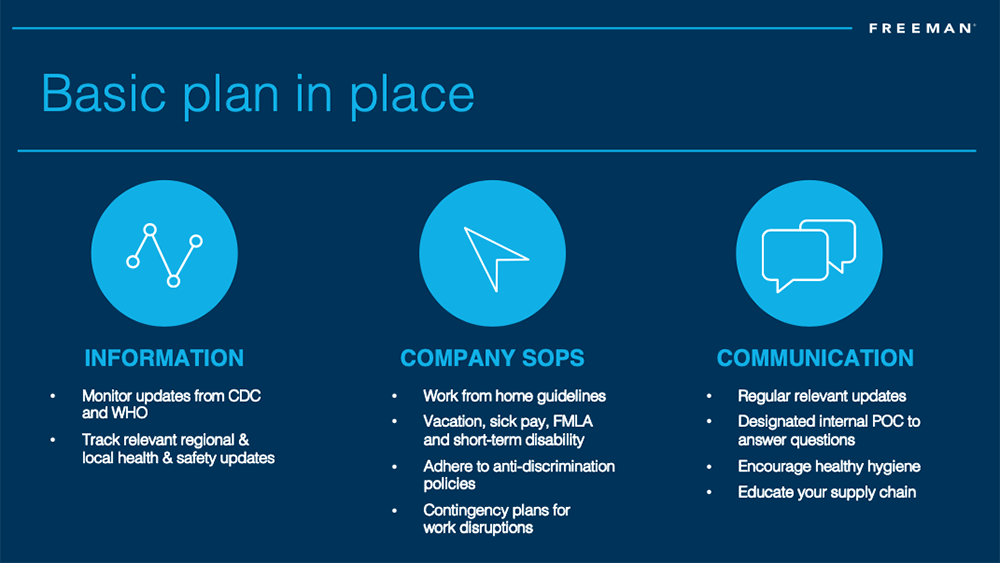
Good communication is key to success for the events industry any time, but especially during the COVID-19 crisis, Freeman’s webinar panelists agreed. (Slides courtesy of Freeman)
Takeaways from the Freeman webinar:
- Use data to help inform your decisions about your event.
- When considering contingency plans for your events, take a customer-centric approach.
- It is important to have a risk-assessment plan in place and updated event contracts and insurance.
Freeman presented a webinar on March 5, “Coronavirus and Its Impact on the Event Industry,” which focused on business continuity and insights on how coronavirus is impacting the business events industry.
The webinar featured Freeman CEO Bob Priest-Heck; Este Geraghty, M.D., MS, MPH, CPH, GISP, chief medical officer, ESRI; Tori Emerson Barnes, EVP, public affairs & policy, US Travel Association; David Saef, SVP, strategy, Freeman; Dawnn Repp, chief legal & administrative officer, Freeman; and Dan Steiner, VP, enterprise risk management, Freeman.
Priest-Heck opened the discussion by reminding participants that during the COVID-19 crisis, it’s important for groups in the business events industry to keep in touch with their audiences and always communicate.
“Our industry has been disrupted by the threat of the coronavirus,” he said. “Things are moving quickly and uncertainty can create anxiety and even panic — and this means that transparency and trust are more critical than ever.”
The industry has seen notable events cancellations, postponements, or migrations to virtual events, he said. But, he pointed out, there is reason for optimism because “the largest percentage of events are continuing.” Less than one percent of the 5,000 events Freeman is working on over the next six months in the U.S., APAC and EMEA regions, and Latin America have canceled at this point, he added.
“Events are not going away, but they will change,” he said, predicting that the number of virtual or hybrid events is on the rise. “Technology solutions enable us to be more agile in meeting our customers’ needs. We need to make it more accessible and more inclusive because we have the tools to enhance the live experience.”
With that, each panelist discussed what event organizers can do in different areas.
DATA
Geraghty from ESRI — a software company specializing in geographic information systems — discussed how event organizers can use data sets that already have been created, like on the WHO website and the Johns Hopkins dashboard created by ESRI to help in decision-making.
“When data are readily available, we can act faster,” she said, adding that spatial information can be displayed at many different levels, including “to create safer environments for large gatherings.”
Event organizers, businesses, or others can build their own localized map at the ESRI website, she said. Factors event organizers should consider when creating a data dashboard to help them make decisions about their events include:
- Local issues such as impacted airports
- Nearby health resources such as clinics, emergency rooms, and pharmacies
- Does your event coincide with any other large events in the same area?
- How are you going to anticipate and manage potential overcrowding on public transportation or in hotel lobbies?
- Operationally, examine your supply chain, your impacted staff, and development of contingency plans
- Environmental data can help “since we know the virus doesn’t like heat or humidity so in warmer climates, the outbreaks could burn out sooner,” she said.
Geraghty emphasized that groups need to be as forceful as they can in their messaging — even if the messages seem obvious — to keep people safe. This includes reminding participants to wash their hands regularly for at least 20 seconds with soap and hot water.
Another key preventative measure event organizers should consider for large gatherings is social distancing. “It may seem counter-intuitive, but we need to start promoting no-handshake events” during the crisis, she said.
Other considerations for event organizers:
- Adding health professionals on site to care for sick people and isolate them from others
- Adding well-paced hand-washing stations with at least 60-percent alcohol-based gels
- Using extra informational signage
TRAVEL
Barnes, from the US Travel Association, updated listeners on what the COVID-19 outbreak means for the travel industry.
“Within the U.S., health experts have given no indication the travel industry should not be operating with a business-as-usual mindset,” she said. “And the U.S. remains a safe place to visit.”
Her organization is in contact with the Centers for Disease Control and Prevention (CDC), the FAA, and the U.S. Department of Transportation for any new updates, she said. But right now, travelers are advised to take the same steps they would during an average flu season. When deciding on whether you should cancel a trip, follow the guidance of these organizations, she said.
 CONTINGENCY PLANNING
CONTINGENCY PLANNING
When considering contingency plans for your events, Freeman’s Saef said, a customer-centric approach is always the right way to go. He re-emphasized the importance of proactive and clear communications for both internal and external audiences as the best way to remain transparent.
Saef discussed the options event organizers can take with their events during the COVID-19 outbreak, by asking these questions:
- Should you keep or modify your event to be fully inclusive of remote audiences?
- Do you postpone to a later date?
- Could you combine or co-locate your event?
- Do you cancel?
If it turns out the best and most appropriate option considering your brand values and your organization’s corporate responsibility is to cancel the event, then that’s what you need to do, he said. “We need to stay true to ourselves,” Saef said. “We need to stay authentic.”
The long-term implications of the decision are the most important consideration, he said, including ensuring attendee and member loyalty to the brand, the support and participation of partners and exhibitors, staying relevant to the industry, and staying respectful of the current situation and those impacted by it.
 RISK AND LEGAL
RISK AND LEGAL
Freeman’s Steiner and Repp emphasized the importance of having a risk-assessment plan within the company and updated event contracts and insurance. They focused on the following:
Have a risk plan. Your basic plan is best if it’s already in place, Steiner said, including company SOPs that cover work-from-home guidelines and contingency plans for work disruptions, among other things.
Stay informed. Monitor updates from CDC and WHO and track relevant regional and local health and safety updates.
Communicate with your workforce and your partners. Communication needs to be efficient, accurate, and appropriate. Also, have a designated internal POC who will answer questions. And communicate and educate your supply chain.
Review your contracts and insurance. As Barbara Dunn, Esq., previously shared with Convene, organizations should review their contracts to determine whether there is a provision which may excuse performance based on COVID-19.
Review and revise your plan as needed. The duo offered two links from Freeman’s partners Fisher & Phillips (U.S.-based) and Baker McKenzie (global) to provide information on risk plans.
On the Web
- Listen to Freeman’s webinar, “Coronavirus and Its Impact on the Event Industry.”
- Find other resources on Freeman’s COVID-19 web page.
What Events Professionals Need to Know About COVID-19
PCMA has created a COVID-19 resources page to help event professionals find reliable information about the outbreak and to share events industry-related resources to ensure they are prepared.
